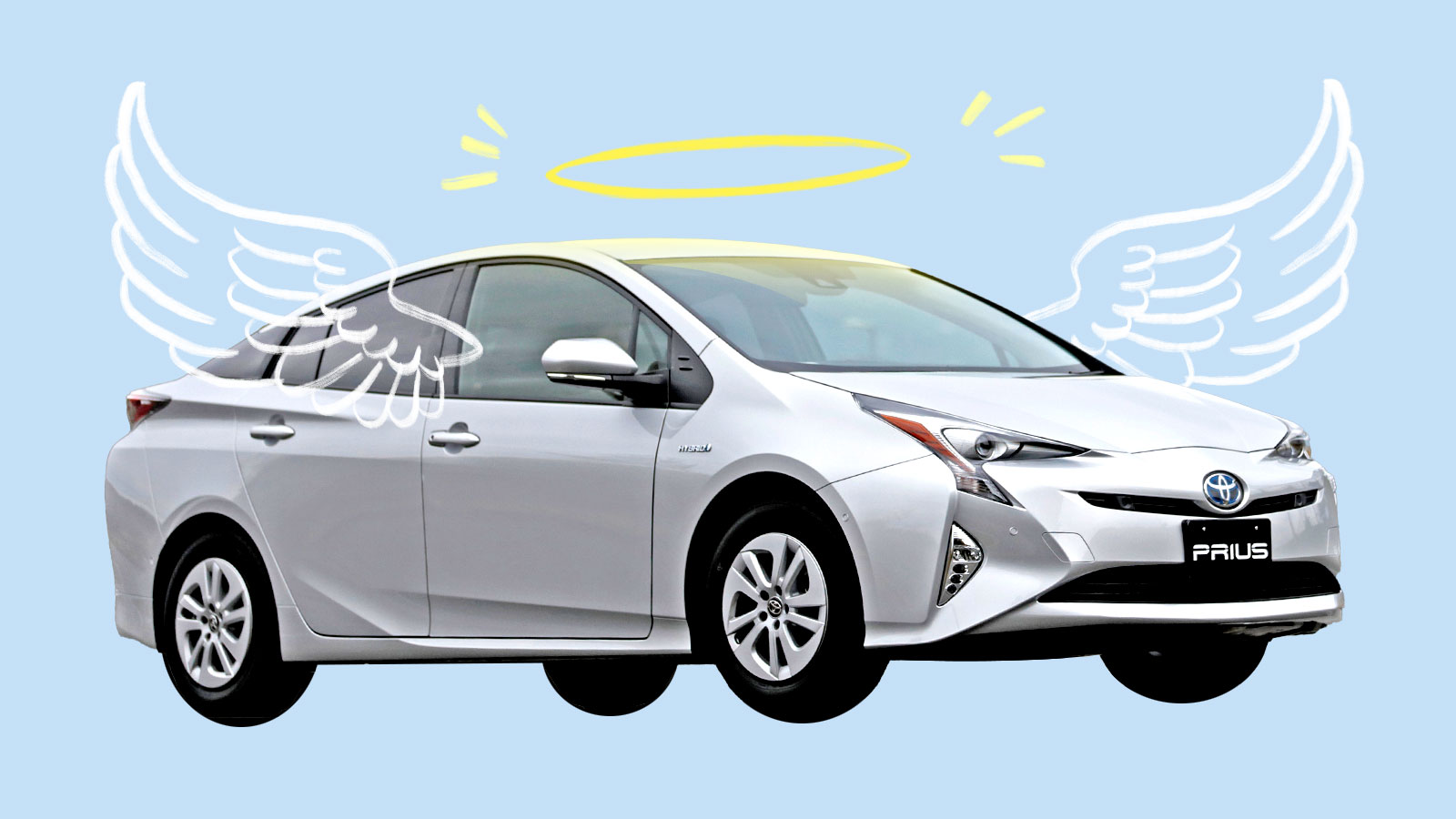On the campaign trail earlier this month, U.S. Senate candidate Herschel Walker from Georgia delivered a strange defense of vehicles that spew gobs of pollution, celebrating their inefficiency. Walker, a Republican who’s facing a runoff race against Democratic Senator Raphael Warnock, told supporters at a rally in Peachtree, Georgia, that America isn’t “ready for the green agenda.”
“What we need to do is keep having those gas-guzzling cars,” Walker said. “We got the good emissions under those cars.”
It was a moment when Walker’s absurd remarks actually squared with the party’s line (unlike, say, his comments about America’s “good air” deciding to float over to China). Republicans have said similar things over the years, displaying a worldview that fossil fuels have inherent virtue, once described as “carbonism.” It’s the belief system that drove former President Donald Trump to bar California from setting stricter emissions standards in 2019, and what led Republican congressmen to defend fossil fuels at the international climate negotiations in Egypt earlier this month.
This pro-pollution point of view can be partly explained by the GOP’s close connection to the oil industry, which funnels millions into Republican campaigns every election year. Walker’s celebration of gas guzzlers can also be understood as a reaction to the notion, quiet but widespread among many environmentally conscious people, that cleaner cars are morally superior.
In 2000, the United States was introduced to the Toyota Prius, marketed as a holier-than-thou, eco-friendly choice. The hybrid car set off a backlash so intense, you can still hear its echoes today. Prius owners were parodied in the cartoon South Park. On the road, hybrid drivers were sometimes blasted by clouds of thick black smoke, targeted by truck owners who had removed their emissions controls. A popular bumper sticker of the mid-2010s simply read “Prius Repellent.” Even Toyota embraced the image with ironic ads.
Today, gasoline-free vehicles are finally starting to go mainstream. When the all-electric version of the Ford F-150 pickup truck — America’s longtime bestselling vehicle, and a favorite among Republicans — was released this spring, its waitlist was three years long. Sales of electric vehicles were up nearly 70 percent in the first nine months of this year compared to the same period last year. And 36 percent of Americans reported that they were considering buying an electric vehicle for their next car, according to polling by Consumer Reports this summer, largely because of high gas prices and cost savings over the long term. For many, the environmental benefits may be just a bonus — or not even be a consideration.
“I don’t have the disposable income to throw $50,000 or $60,000 at a car just to help the environment,” Russell Grooms, a librarian in Virginia who bought a battery-powered Nissan Leaf, recently told the New York Times. “It really came down to numbers.”
In a Prius commercial from 2008, a hitman drags a body out of his car in the middle of the night and dumps it in the river. “Well, at least he drives a Prius,” the ad says.
It was one of many advertisements that poked fun at the car’s environmental bona fides. The joke relies on understanding that driving a Prius is a form of moral “capital” that can be used to “offset life’s other sins,” wrote Sarah McFarland Taylor, a religion scholar, in the book Ecopiety: Green Media and the Dilemma of Environmental Virtue.
Buying a Prius isn’t really that pious an act. After all, the vehicle takes a lot of fossil fuels to manufacture and runs mostly on gasoline. The most eco-friendly move: not buying a car at all. But that didn’t stop the hybrid from taking off as a righteous choice. Within two years of its release in America, the Prius had gathered a long list of celebrity owners, including Leonardo DiCaprio, Cameron Diaz, and Larry David. In 2002, the Washington Post called the Prius “Hollywood’s latest politically correct status symbol.”
For conservative commentators, that symbol made for a ripe target. “The bottom line here is that people that are buying Priuses are doing it for glamor reasons,” Rush Limbaugh said on his radio show in 2005. “They wanted to appear virtuous. But they’re accomplishing nothing … These liberals think they’re ahead of the game on these things, and they’re just suckers.”
It wasn’t just Limbaugh. In 2006, South Park devoted an entire episode, called “Smug Alert,” to making fun of holier-than-thou Prius owners. It opens with Kyle’s dad, Gerald, showing off his new hybrid car, the “Toyonda Pious.”
“I just couldn’t sit back and be a part of destroying the Earth anymore,” Gerald tells his neighbor with a condescending smile.
“Well, there goes the high and mighty Gerald Broflovski,” one onlooker comments. “Yeah, ever since he got that new hybrid he thinks he’s better than everyone else,” another says. Not long after the episode aired, a market research firm found that 57 percent of Prius owners said the main reason they bought one was that “it makes a statement about me,” versus 36 percent who said they bought it for the good gas mileage.
The car remained popular — hitting the mark of 1 million vehicles sold by 2011 — and so did parodying it. In 2012, the satirical news site The Onion made a commercial about a new, even greener Prius that “reduces its driver’s carbon footprint to zero by impaling them through the lungs with spikes as soon as they get in the car.”
The air of moral superiority around the Prius led to real-life consequences. Certain pickup truck owners took joy in rebelling against it, rolling up in front of hybrids and engulfing the vehicles in plumes of tailpipe smoke. This testosterone-fueled practice of “rolling coal” — modifying diesel engines to spew clouds of sooty exhaust — became a health menace in the mid-2010s. Directed at electric car owners, pedestrians, bikers, or anyone unlucky enough to be in the vicinity, rolling coal became for these aficionados a defiant symbol of American freedom — signaling “don’t tell me what to do.”
When states moved to ban rolling coal, some drivers pushed back, the New York Times reported in 2016. “Why don’t you go live in Sweden and get the heck out of our country,” one diesel truck owner wrote to an Illinois state representative who proposed a $5,000 fine for removing emissions equipment. “I will continue to roll coal anytime I feel like and fog your stupid eco-cars.”
One of the pitfalls of framing environmental concerns in moral terms is that it can provoke a counterreaction, especially when tied to individual behavior. One study found that listening to eco-friendly tips actually makes people less likely to do anything about climate change. Think about eating meat, often discussed as a moral issue among people concerned about animal rights or climate change. Fast-food chains like Taco Bell and Burger King have expanded their vegetarian menu items; meanwhile, Arby’s has leaned into the opposing “pro-meat” demographic. In 2018, Arby’s ran an ad with the tagline “Friends don’t let friends eat tofu.” The following year, the chain trolled vegans by introducing the “marrot,” a carrot made out of meat.
As America has grown more and more polarized, seemingly innocuous things have become associated with the other party, from pizza chains to sports leagues. One in five voters say that politics has hurt their friendships; there’s a growing aversion to dating people from the opposite party. With hybrids and electric vehicles owned most often by Democrats, Republicans like Walker might try to distance themselves from their perceived enemies by signaling their affection for fuel-hungry vehicles.
To be sure, the environment is still a major reason to buy a greener car for many Americans, especially among those on the political left. Almost three-quarters of those who would consider buying an electric vehicle said that helping the environment was a key consideration, according to polling from Pew Research. And in a survey released this month, 10 percent of Americans said it was “morally wrong” to drive a car that gets bad gas mileage. But even as they’re rolling out new electric models, car companies don’t seem to be chasing efficiency — instead, they’re making big trucks and SUVs. And they’re gaining popularity across party lines.
Aside from some lingering resentment against eco-friendly cars and what Walker called the “green agenda,” the United States seems to be moving beyond the hangups that surrounded the Prius. Over the last decade, the success of Tesla — which marketed its vehicles as cool and desirable, not a virtuous choice — paved the way for other carmakers to follow in hot pursuit.
“The [Tesla] Model S completely delivered on its promise to change how the world thought about electric cars,” Jake Fisher, the senior director of Consumer Reports’ auto center, said earlier this year. “EVs were no longer the vegetables you should eat — they became the dessert you desired.”



